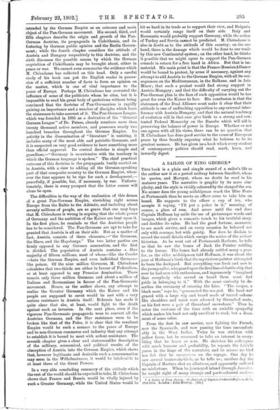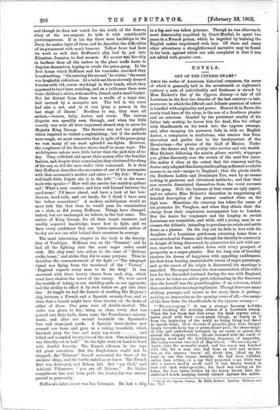A SAILOR OF KING GEORGE.*
THIS book is a plain and simple record of a sailor's life as the author saw it at a period midway between Smollett, whom he quotes, and Marryat, whom no doubt he .read in his maturer years. The narrative is graphic by its mere sim- plicity, and the style is vividly coloured by the slang of the sea. No sooner does the young midshipman reach the Blue Posts at Portsmouth than he meets an officer come to take him on board. He suggests to the officer a cup of tea, who accepts it saying, "I'll put a poker in it," meaning, of course, a glass of rum. And never until the end does Captain Hoffman lay aside the use of picturesque words and images, which gives a romantic touch to his truthful story, and doubles its value. He had the good fortune, moreover, to see much service, and on every occasion he behaved not only with courage, but with gaiety. Nor does he disdain to record the small details which escape the notice of the serious historian. As be went out of Portsmouth Harbour, he tells us that he saw the bones of Jack the Painter rattling to the breeze. The bones had already rattled many a years for, as the elder midshipman told Hoffman, it was about the year of Hoffman's birth that the mysterious painter attempted to burn the dockyard. But everything was fresh and new to the young sailor, who gazed upon the first line-of-battle ship that ever he had seen with enthusiasm, and ingenuously "imagined that everybody who served on board them must feel pride in belonging to it." With the same curiosity he de- scribes the ceremony of crossing the Line. "The cooper, a black man," says he, "personated the sea-god. His head waB graced with a large wig and beard made of tarred oakum- His shoulders and waist were adorned by thrumbed mats; on his feet were a pair of Greenland snowshoes." Thus be notes the customs of the time with an amiable sympathy which makes his book not only excellent to read, but a docu- ment of some value.
From the first he saw service, now fighting the French, now the Spaniards, and now pawing the time uncomfort- ably in the West Indies. Twice he was stricken with yellow fever, but he recovered to take an interest in every- thing that he hears or sees. He sketches his colleagues with much humour and probability, he repeats the fo'c's'le yarns in the lingo of the narrators, and he misses no bird nor fish that be encounters on the voyage. One day be saw several boatswain-birds, as he tells us ; another day the Captain of Marines shot an albatross, and apparently suffered no misfortune. When be journeyed inland through Jamaica, he caught sight of many strange and parti-coloured snakes ;
• A Sailor of King George: the .Tournals of Captain Frederick Mofman, 1793-1811, London; John Murray. [122.] and though he does not vouch for the truth of the famous story of the sea-serpent, he tells it with considerable picturesqueness. If in his day there were hardships in the Navy, he makes light of them, and he describes the difficulties of im pressment with much humour. 'Yellow fever had done its work so well that Hoffman's ship had to put into Kingston, Jamaica, to find seamen. No sooner was-the ship in harbour than all the sailors in the place maile baste to
• disguise themselves, hoping to evade the press-gang. In the first house which Hoffman and his comrades searched they found nothing. "On entering the second," he writes, "the scene • was laughably ridiculous. At a table sat three slovenly dressed females with old, coarse stockings in their hands, which they appeared to have been mending, and on a table near them were some children's shirts, with needles, thread, and a small basket. Not far distant from them was a cradle of a large size, half covered by a mosquito net. The bed in the room had also a net, and in it was lying a person in the last stage of illness." Needless to say, they were all eailors,—women, baby, doctor, and nurse. The various disguise was speedily seen through, and when the little -comedy was over all were impressed aboard ship to serve his Majesty King George. The Service was not too popular which required so violent a replenishing ; but if the methods were rough, we must remember that in spite of the press-gang we won many of our most splendid sea-fights. However, the roughness of the Service shows itself in many ways. The midshipmen ashore were little better than the jack-tars of to- day. They rollicked and spent their money after the familiar fashion, and, despite their commission, they chattered the slang of the sea, as did the men under their command. It is thus that Hoffman describes the encounter of one of his messmates with that messmate's mother and sister:—" By Job! What a well-built little frigate she is to the left ! "—it is the mess- - mate who speaks—" How well she carries her maintop-gallant sail ! What a neat counter, and how well formed between the
yard-arms ! heave ahead, and have a look at her bow- chasers, head rails,' and cat heads, for I think I have seen 'her before somewhere." A modern midshipman would no more talk like that than he would pass his examination on a slate, as did young Hoffman. Things have changed, indeed, but are unchanged, we believe, in the best sense. The sailors of King George, for all their rough manners and readily acquired knowledge, knew bow to fight, and we have every confidence that our better-instructed sailors of to-day are not one whit behind their ancestors in courage.
The most interesting chapter in the book is the descrip- tion of Trafalgar. Hoffman was on the Toimant,' and he Lad all the fighting that the most eager sailor could wish. klis ship went into action to the tune of "Britons, strike home," and strike they did to some purpose. Thus he describes the commencement of the fight:—" The telegraph signal was flying from the masthead of the ' Victory ' : England expects every man to do his duty.' It was answered with three hearty cheers from each ship, which must have shaken the nerve of the enemy. We were saved the trouble of taking in our studding-sails, as our opponents had the civility to effect it by shot before we got into their line. At length we had the honour of nestling His Majesty's ship between a French and a Spanish seventy-four, and so close that a biscuit might have been thrown on the decks of either of them. Our guns were all double-shotted. The order was given to fire; being so close, every shot was poured into their hulls, down came the Frenchman's mizzen- masts, and after our second broadside the Spaniard's fore and cross-jack yards. A Spanish three-decker now crossed our bows and gave us a raking broadside, which
knocked away the fore and main top-masts and killed and wounded twenty-two of the men. One midshipman was literally cut in half." So the fight went on hand to hand with fearful ferocity. The French riflemen in the tops did great execution. But the Englishmen could not be stopped; the Tonnant ' herself accounted for three of the enemies' ships, and the battle ended as we know. The French fleet was destroyed, and Nelson fell. But "my God," said Admiral Villeneuve, "you are all Nelsons." No higher compliment has ever been paid : the beaten foe was uncon-. Auered in generosity.
Hoff inan's later career was less fortunate. He lost a ship in a fog and was taken prisoner. Though he was afterwards most aiUhourably acquitted by Court-Martial, he spent two years in a French prison, which he beguiled by training the English cadets imprisoned with him. Of these and many other adventures a straightforward narrative may be found hi his book, against which our sole complaint is that it was not edited with greater care.











































 Previous page
Previous page